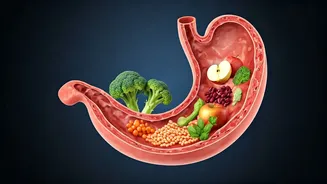Hidden Gut Threats
The modern emphasis on health often overlooks the impact of seemingly beneficial foods on gut health. According to a Harvard-trained gastroenterologist,
several foods frequently touted as healthy may paradoxically harm the digestive system. These foods can disrupt the delicate balance of the gut microbiome, leading to various health problems. Recognizing these hidden threats is crucial for maintaining optimal digestive function. Understanding which foods contribute negatively and why is the first step toward promoting better gut health. Awareness of the impact of these foods allows for informed dietary choices, supporting overall well-being. This requires a shift in perspective, moving beyond general health claims to consider specific effects on the gut. Making informed decisions regarding the foods consumed plays a vital role in protecting and enhancing one's gut health. This approach will equip individuals with the tools needed to cultivate a thriving gut environment.
Dairy's Digestive Downsides
Dairy products, often marketed as essential for bone health, can pose significant challenges for some individuals' guts. Lactose intolerance, a common condition, means the body struggles to digest lactose, a sugar found in dairy. This can lead to bloating, gas, and digestive discomfort. Even for those without lactose intolerance, the proteins in dairy might cause inflammation in the gut. Excessive dairy consumption has been linked to increased inflammation in certain people, potentially affecting gut health. The high saturated fat content in some dairy products could also negatively impact gut bacteria balance. Exploring alternatives such as lactose-free dairy or plant-based options like almond or soy milk can mitigate these effects. Careful consideration of individual sensitivities and potential inflammatory responses is essential. Understanding how dairy affects gut health is vital in maintaining a healthy digestive system. People with dairy sensitivities may benefit from eliminating or reducing dairy intake.
Gluten: A Gut Disruptor
Gluten, a protein found in wheat, barley, and rye, is another culprit that can cause distress within the gut. For those with celiac disease, gluten triggers an immune response that damages the small intestine. This can impair nutrient absorption and lead to various health issues. Even without celiac disease, some individuals experience gluten sensitivity, which can result in symptoms such as bloating, abdominal pain, and fatigue. Gluten can also contribute to intestinal permeability, often referred to as 'leaky gut,' allowing substances to escape into the bloodstream and causing inflammation. Reducing gluten intake or eliminating it entirely, can help improve gut health for sensitive individuals. Consider alternatives such as rice, quinoa, or gluten-free bread to reduce exposure. Awareness of gluten's impact and mindful food choices are vital steps in promoting gut health and overall well-being. Evaluating personal reactions to gluten helps determine whether to modify one's diet for better digestion.
Processed Foods' Perils
Processed foods, laden with additives, preservatives, and unhealthy fats, can severely disrupt the gut environment. These foods often lack the fiber needed to nourish beneficial gut bacteria. The additives such as emulsifiers and artificial sweeteners can alter the balance of the gut microbiome, increasing inflammation. Consuming excessive amounts of processed foods can lead to gut dysbiosis, which is an imbalance of gut bacteria. The artificial ingredients often found in these foods may contribute to gut permeability and inflammation, worsening symptoms of digestive issues. Choosing whole, unprocessed foods is a key strategy for supporting gut health. By eating fresh fruits, vegetables, and whole grains, you're nourishing your gut with essential nutrients and fiber. Reduce your intake of ready-made meals and packaged snacks. Prioritize fresh, homemade meals to support a healthy digestive system. Recognizing the detrimental effects of processed foods can help individuals make wiser dietary choices.
Sugary Sweeteners' Impact
Excessive consumption of added sugars, particularly in the form of high-fructose corn syrup, can negatively impact gut health. These sugars feed harmful bacteria in the gut, leading to an imbalance. This imbalance can result in increased inflammation and potential damage to the gut lining. High sugar intake can also contribute to insulin resistance and metabolic issues, which indirectly affect the gut. Artificial sweeteners, used as sugar substitutes, may also disrupt the gut microbiome. While they provide fewer calories, they can alter the balance of gut bacteria, potentially leading to digestive issues. Reducing sugar intake and being mindful of hidden sugars in processed foods can support better gut health. Focusing on whole foods and naturally sweet options, like fruits, is a better approach. Understanding the impact of different sweeteners is crucial for making informed dietary choices.
Unhealthy Fats’ Effects
The type and quantity of fats consumed have a significant impact on gut health. Diets high in saturated and trans fats can promote inflammation and disrupt the gut microbiome. These fats may also increase the risk of developing gut-related issues. In contrast, healthy fats, such as those found in avocados, olive oil, and fatty fish, have anti-inflammatory properties and can support a balanced gut. Avoiding processed foods high in unhealthy fats is vital for good gut health. Reading food labels to check the fat content, especially saturated and trans fats, is important. Choosing foods rich in omega-3 fatty acids, like salmon, provides additional health benefits. Prioritizing healthy fats is an essential component of a gut-friendly diet. Making informed choices about fat consumption supports overall digestive health and overall well-being. By integrating these strategies, individuals can create a foundation for a healthy gut.
























